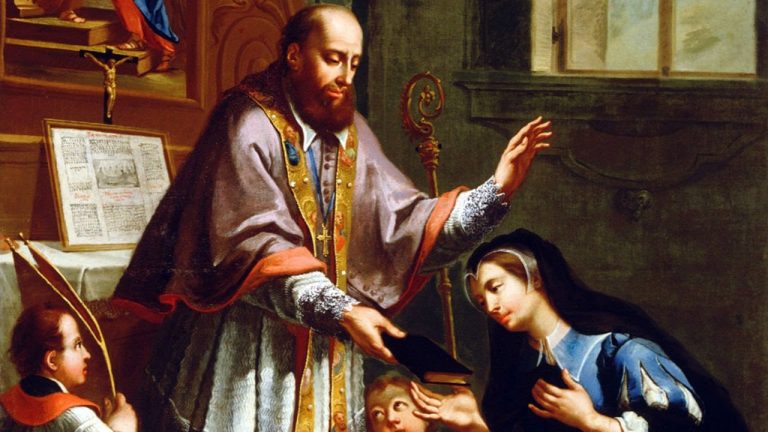By Ralph Martin

St. Francis de Sales was born on August 21, 1567, in France, near the present-day Swiss border. He was the firstborn of thirteen children, five of whom died in infancy, and was named after Francis of Assisi. His father, also named Francis, at the age of forty-three married a young girl named Frances, who was fourteen years old at the time. Unlike Augustine, Francis grew up in the faith, and when he was twelve years old he felt strongly called to serve the Lord as a priest. He was well educated, and studied at the Jesuit College in Paris, and was fluent in both Latin and French. He was accomplished in the “arts of the nobility” (horsemanship, fencing, dancing). He pursued higher studies in law and theology at the University of Padua and received a doctorate at the age of twenty-four.
The University of Padua was a large, cosmopolitan university with over twenty thousand students. It was there that Francis learned the wisdom that enabled him to live a life of holiness in the midst of the world, wisdom which he later developed in detail in his famous work, Introduction to the Devout Life. His other major work is the Treatise on the Love of God, which presents a detailed account of the more advanced stages of the spiritual journey.
After completing his studies he was given a title of nobility and offered a senatorship in the senate of Chamberey. Francis’s father, now seventy years old, had picked out a fourteen-year-old girl for him to marry, an offer that he declined. He finally told his father of his vocation to the priesthood.
After ordination, he was assigned to try to re-establish the Catholic Church in a region near Geneva, which had come under Calvinist domination. Geneva was the diocese in which Francis was born and in which he served as a priest, but during his lifetime it remained firmly in the hands of the Calvinists and the Catholic bishop resided in exile in Annecy, France, not a great distance to the south.
During this time, when passions were running strong between Catholics and Protestant reformers, Francis carried out his mission in a way that showed considerable respect for the Protestants while firmly holding to Catholic truth. In this regard, as in so many others, he anticipated the ecumenical spirit and policy of the Second Vatican Council. He declared that prayer, alms, and fasting would be the spiritual means used in re-establishing the Church in the region. While firmly resolved to win back Geneva to the Catholic Church, Francis declared that it must be done with charity, and that he and his collaborators should suffer deprivation rather than their adversaries. He received special permission to read Calvin’s major works so he could have a firsthand acquaintance with their thought. He also made private visits to the successor of Calvin in Geneva in an attempt to win him over, efforts that appeared to be unsuccessful but were cordial and established mutual respect.
The years spent in this early mission were difficult. Because of the great hostility to his work, Francis often had to flee in order to avoid being beaten, or worse. He did convince some of the Calvinist pastors to engage him in public debate, however, and also posted hand-copied pamphlets in public places or slipped them under the doors of homes as a way of sharing the Catholic truth. Eventually, he did achieve considerable success. Many Catholic parishes were re-established, and much of the population reconciled with the Church.
At a certain point Pope Clement VIII invited Francis to Rome to engage in theological debate with the theologians of Rome. He did so well that he was named the coadjutor bishop of Geneva and eventually succeeded to the See of Geneva when the former bishop died. Still unable to reside in Geneva itself, he continued the Catholic exile in Annecy.
On a mission to Paris he came in contact with the writings of Teresa of Avila, who had died only twenty years before and whose reformed Carmelites were establishing a convent in France. He also had occasion to make the Spiritual Exercises of Saint Ignatius several times, which confirmed his belief that all Catholics are called to holiness. As a bishop he placed great emphasis on the recruitment and formation of priests, ordaining nine hundred priests in his twenty-two years as bishop. He always encouraged his priests to look for lay people called to “devotion” and work with them, giving them formation.
In 1609 he published Introduction to a Devout Life, which has been in print ever since. Experiencing a variety of health problems, Francis died of a stroke on December 28, 1622, at the age of fifty-five. He was canonized a saint in 1665, and declared a Doctor of the Universal Church in 1877.
Up until the time of Francis, priests, nuns, or monks wrote almost all of the books on the spiritual life. Although these works contained much that was useful for lay people, and oftentimes their writers did attempt to relate what they were writing to lay life, they were nonetheless particular to religious life. Francis set out to write a book specifically for people living in the “world.”
Ralph Martin’s modern classic on the spiritual life, The Fulfillment of All Desire: A Guidebook for the Journey to God Based on the Wisdom of the Saints, is a perennial best-seller. Set out on the path to holiness with this indispensable work.